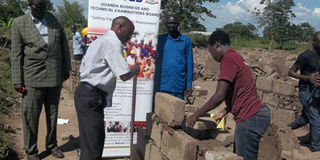Vocational studies taking on new face

Vocational studies are taking on new face
What you need to know:
- Lately, technology and use of electrical machines has eased vocational studies.
- Experts say this trend is making more people embrace vocational training.
Abdul Kabugo, a foreman at a construction site in Kisenyi, Kampala, recalls the days after his graduation from Nile Vocational Institute in Jinja in 2006. Kabugo says mixing concrete was done by casual labourers at the site which was hectic and time-consuming but now with the invention of the concrete mixer work has been simplified.
“The engineer is only there to ensure that the right ratios have been placed in the mixer. Delivery to the point you want the material is also done by the machine itself not workers carrying it on their heads in buckets,” he notes. Kabugo and others in his trade recognise that gone are the days vocational studies required use of a lot of manpower.
Ali Waiswa, a lecturer and instructor of motor vehicle mechanics at Busia Central Technical Institute, says they have a task to advance in some areas of the curriculum and update notes on most courses. “The time we trained, some machines had not been invented, now we have to read and match the new trend,” says Waiswa.
Technology advancement
If you have visited a garage lately, you will notice that although mechanics will roll under the engine to repair your car, they may use a computer to locate the faulty part.
“Originally, mechanics used their eyes to locate the faulty part in a car, today there is computer software designed for that role,” reaffirms Daphine Nalwoga, a mechanic at Meta motor mechanics and repair in Kibuli, Kampala.
She adds that painting the body of the car may look manual work but it is not the case, “We use computer applications to mix the colours. It becomes a challenge at times when you cannot match the colours to give the car a good finish.”
In carpentry, the work has been made easy helping carpenters take on as many orders as possible from customers as Henry Wekha, a carpenter at Siraj Carpentry and Joinery workshop in Kampala says.
“We now have solar machines which have reduced power expenses for sand papering, planing, and grooving,” says Wekha adding that this has seen many carpenters advance from relying on orders to making readily available products for sale.
Effect of the change
Musa Masembe, a student of brick laying and concrete practice at Nile Vocational Institute, says all these changes require that you have advanced knowledge in computer science. “Most of the equipment is computerised so one cannot manage this work if they do not have computer knowledge,” says Masembe.
Much as change has been embraced, there are some challenges it has posed in the vocational sector. Most people who studied when the training was largely manual are struggling to adapt.
Harder work
For plumbing, the changes have come with a lot of work and need for labour because Moses Bulira, a plumber in Bweyogere, says while initially the equipment would be placed on the wall, the new trend, most of them have to be inbuilt. “The toilet cisterns that used to be placed on the surface have to be put inside the wall. This is good because it is not susceptible to damage and will last for long,” says Bulira adding that for him to cope with the change, he has had to read more.




